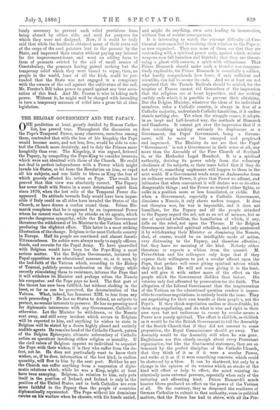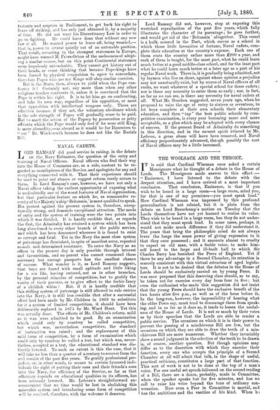THE BELGIAN GOVERNMENT AND THE PAPACY.
ONE prediction at least, greatly derided by Roman Catho- lics, has proved true. Throughout the discussion on the Pope's Temporal Power, many observers, ourselves among them, contended that with the loss of his kingship the Pope would become more, and not less, free, would be able to con- trol the Church more decisively, and to defy the Princes more haughtily than ever. The Kingship, it was argued, fettered the Papacy, by compelling the Pope-King to consider interests which were not identical with those of the Church. He could not deal in perfect independence with a Power which might invade his States, or let loose the Revolution on him, or expel all his subjects, and was liable to blows as King the fear of which gravely affected his action as Pope. The result has proved that this view was absolutely correct. The Papacy has never dealt with States in a more determined spirit than since 1870, when the last relic of the Temporal Power dis- appeared. Its attitude towards Italy would have been impos- sible if Italy could on all sides have invaded the States of the Church, or have drawn a cordon round them. Prince Bis- marck complains that he is opposed by an impersonal Power whom he cannot reach except by attacks on its agents, which provoke dangerous sympathy, while the Belgian Government threatens the withdrawal of its Minister to the Vatican without producing the slightest effect. This latter is a most striking illustration of the change. Belgium is the most Catholic country in Europe. Half its people are convinced and almost fanatic Ultramontanes. Its nobles were always ready to supply officers, funds, and recruits for the Papal Army. To have quarrelled with Belgium would have been for the Pope-King a most serious matter. Yet the Belgian Government, irritated by Papal opposition to an educational measure, or, as it says, by the bad-faith of the Vatican which, according to the Bishop of Tonrnai, publicly presses moderation on the clergy while secretly stimulating them to resistance, informs the Pope that it will withdraw its Minister and perhaps refuse the Nuncio his exequatur, and the Pope pays no heed. The first part of the threat has now been fulfilled, but without shaking in the least, so far as can be perceived, the determination of the Vatican. What, indeed, has Innocent XIII. to fear from any such proceeding? He has no States to defend, no subjects to protect, no secular interests to preserve. He has no pressing need for diplomatic intercourse with any Government, Catholic or otherwise. Let the Minister be withdrawn, or the Nuncio sent away, and still every incident • which occurs in Belgium will be reported to him, and anything he wishes to state in Belgium will be stated by a dozen highly placed and entirely audible agents. He remains head of the Catholic Church, patron of the Belgian Episcopate, ultimate referendary of Catholic action on questions involving either religion or morality. If the civil rulers of Belgium appoint no individual to acquaint the Pope with their wishes, it is they who suffer from the de- fect, not he. 'He does not particularly want to know their wishes, or, if he does, information of the best kind, in endless quantity, wiU fow to him by the next post. Neither he nor the Church can suffer anything from a suspension of diplo- matic relations which, while he was a King, might at least have been annoying. Belgium, in relation to him, only puts itself in the position of Ireland, and Ireland is only in the position of the United States, and in both Catholics are even more faithful to the Papacy than the people of countries diplomatically represented. The Pope without his dominions carries on his warfare when he chooses, with his hands untied,
and might do anything, even acts leading to insurrection, without fear of secular consequences.
It is interesting to watch the extreme difficulty all Con- tinental statesmen feel in realising their relation to the Papacy, as now organised. They can none of them see that they are contending with a spiritual power only, against which secular weapons now fall harmless and blunted ; that they are threat- ening a ghost with cannon, a spirit with ultimatums. That Prince Bismarck should make such a blunder was compara- tively explicable, for Prince Bismarck is essentially a soldier, who hardly comprehends how force, if only sufficient and scientific, can fail to secure its ends. And we at least are not surprised that the French Radicals should be misled, for the sceptics of France cannot rid themselves of the impression that the religious are at heart hypocrites, and are seeking earthly ends which it is possible to prevent their obtaining. But the Belgian Ministry, whatever the ideas of its individual members, rules a Catholic country, is always in fear of a Catholic majority, understands Catholic fanaticism, if it under- stands nothing else. Yet when the struggle comes, it adopts, in an inept and half-hearted way, the methods of Bismarck and Gambetta. It cannot get over the impression that if it does something marking seriously its displeasure as a Government, the Papal Government, being a Govern- ment; will be more or less annoyed and perplexed, and impressed. The Ministry do not see that the Papal " Government " is not a Government in their sense at all, any more than the Assembly of the Free Church of Scotland is, or the Methodist Legal Hundred. It is a spiritual authority, deriving its power solely from the voluntary obedience of its subjects, or their inner belief that if they do not obey it, something unpleasant will happen to them in the next world. If a Government sends away an Ambassador from an ordinary secular Power, it gives that Power an affront, and intimates that when convenient it will declare war or do other disagreeable things ; and the Power so treated either fights, or sulks in a position more or less humiliated, or yields. But when a Government, especially a Catholic Government, dismisses a Nuncio, it only shows useless temper. It does not threaten war, for war is impossible, and it does not humiliate, for the Papacy and all the people attached to the Papacy regard the act, not as an act of menace, but as one of spiritual rebellion, the humiliation of which, if any, falls on the rebel, not upon the Throne. If the Belgian Government intended spiritual rebellion, and only annbuiiced it by withdrawing their Minister or dismissing the Nuncio, that, of course, would be an intelligible mode of action, very distressing to the Papacy, and therefore effective ; but they have no meaning of the kind. Nobody either threatens or expects a schism from the quarrel. M. Frere-Orban and his colleagues only hope that if they express their willingness to put a secular affront upon the Pope, that prelate will cease giving spiritual advice which they do not like. He will not cease giving it in the least, and will give it with rather more of the effect on the people which the Government dislikes than before. His votaries only feel affronted by persecution for the faith. The allegation of the Liberal Government that the tergiversation of the Vatican on the educational question renders it impos- sible to continue negotiations, is entirely beside the issue. They are negotiating for their own benefit or their people's, not the Pope's. If they think negotiation useless or discreditable, let them stop negotiating, and do what is wise and right in their own eyes, but not endeavour to coerce by secular means a Power now purely spiritual. The effort is childish, as childish as it would be for the British Government to tell the Assembly of the Scotch Church that if they did not consent to some proposition, the Royal Commissioner should go away. The Assembly would be the Assembly still when he was gone. Englishmen see this clearly enough about every Protestant organisation, but like the Continental statesmen, they are so - bemused by the perfect discipline of the Catholic Church, that they think of it as if it were a secular Power, and strike at it as if it were something concrete, which could be shattered by a blow. It can be shattered, but only by a change in the opinion of its votaries which no stroke of the kind will effect or help to effect, the mind resisting in- stinctively mere external pressure, especially when only of the irritating and affronting kind. Prince Bismarck's much heavier blows produced no effect on the power of the Vatican at all. On the contrary, they so deepened the readiness of German Catholics to submit to that authority, even in political matters, that the Prince has had to strive, with all the Pro-
testanta and sceptics in Parliament, to get back his right to leave off striking, and has only just obtained it, by a majority of four. He did not want his Discretionary Law in order to go on fighting. He could have done that without any new law at all. He wanted power to leave off, being wearied,— that is, power to retreat quietly out of an untenable position. That result, occurring to the strongest statesman in Europe, might have warned M. Fri:re-Orban of the uselessness of adopt- ing a similar course, but on this point Continental statesmen seem hopelessly unteachable. They cannot get history out of their heads, or cease thinking that because Pope-kings have been forced by physical compulsion to agree to concordats, therefore Popes who are not Kings will obey similar coercion. But is the State, then, always to yield when the Pope con- fronts it ? Certainly not, any more than when any other religious teacher confronts it, unless it is convinced that the Pope is within his right. It is to let him go on confronting, and take its own way, regardless of his opposition, or meet that opposition with intellectual weapons only. These are effective because, if they act, the voluntary obedience which is the sole strength of Popes will gradually cease to be paid. But to meet the action of the Papacy by persecution or petty affronts which the Pope would only feel if he were still King, is mere absurdity,—as absurd as it would be for Dissenters to " cut " Dr. Wordsworth because he does not like the Burials Bill.



































 Previous page
Previous page